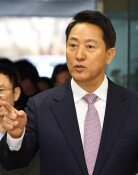President Rohs Overreaction to Regionalism
President Rohs Overreaction to Regionalism
Posted September. 03, 2005 08:34,
If the president says, "With its fate at stake, the nations regional problem is the administration`s top priority." in regards to todays situation, it is highly likely that the statement is coming from a political alibi with another intention.
Choi Jang-jib , a leading progressive political scientist and professor at Korea University, presented public criticism over President Roh Moo-hyuns remarks on coalition and regionalism and his way of conducting state affairs in the revision of his recent book, Democracy in Post-Democratization, published by Humanitas.
Choi offered his criticism March last year when the National Assembly tried to impeach President Roh, saying, Majority forces in the National Assembly did major damage to the constitutional system by attacking and paralyzing the most core part of the constitutional system established as a result of democratization. In this regard, Chois criticism of the government is attracting public attention all the more.
The Wrong Understanding of Regionalism-
Choi criticized sharply, Saying that the root cause of Korean politics is regionalism and that President Roh can forego being part of the government is intended not to fully face the elements of social conflicts and divisions existing in reality. The remark is an accusation against President Rohs recent remark that he could give up his entire authority to overcome regionalism.
Choi also pointed out that the president has the wrong understanding of the nature of regionalism. He said that the president is exaggerating the problem of regionalism as it has been alleviated considerably since the Kim Dae-jung administration.
Choi expressed his concern that the governments core policies like innovation cities and corporate cities that were designed to address regionalism and seek a balanced national development could in fact worsen regionalism. He explains that that is because those policies are contributing to the rise of new competition and conflict among local governments and local interest groups. He also predicted that a multi-number district system which the ruling Uri Party offered as a way to address regionalism could also intensify regionalism, compromising the development of democracy as a result.
Dark Clouds over the Government-
Choi also made a harsh remark about President Rohs way of conducting state affairs and core policies. He starkly evaluates, It is certain that public demonstration of a perspective that denies party politics or emphasis on a leaders historic decision to seek development of the entire country by bypassing or transcending party politics would contribute to a weakening democracy.
He was negative about the administrations democracy. He evaluated, The potential and resources that have underpinned Koreas democratization are depleted, adding, There are much darker clouds over the incumbent administration compared to former democratic governments.
Kwawg-Pyo Lee kplee@donga.com jkmas@donga.com







